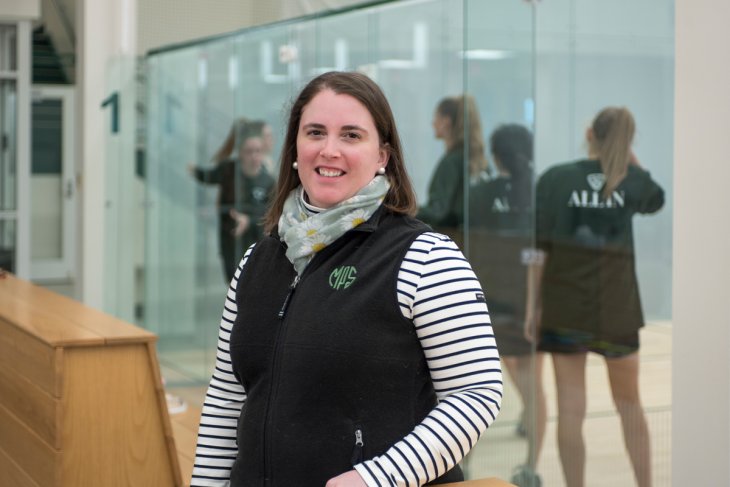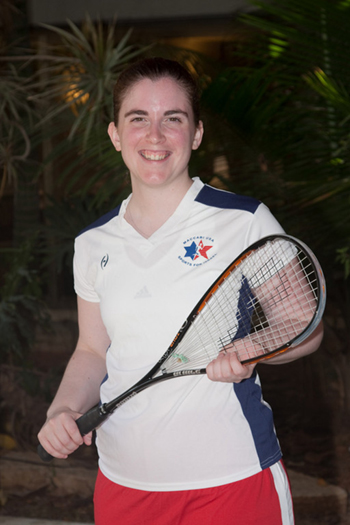Sarah Odell '06

"Athletics are a safe place for girls in particular to fail, and to fail and learn from it without fear."
Sarah Odell '06 has spent spent much of her life playing inside a big box, and she wouldn’t have it any other way. While Odell has sampled other sports — she played field hockey and rowed crew her first year at Exeter — her real passion is squash, a game she discovered at age 9.
Odell grew up outside Philadelphia, the city that has the most squash courts per capita in the U.S. (Toronto is the only city in North America that has more courts per capita than Philadelphia.) “In gym class if you’re in private school, they’ll hand you a squash racket,” Odell says of growing up there.
Odell loved the sport as soon as she started taking lessons. She’s also been quite successful. She was team captain while at Exeter and was a four-year number one player at Wellesley College, where she was team captain during her junior and senior years. In 2009, Odell represented the U.S. at the Maccabiah Games in Israel, where she won a silver medal. Since college, Odell has served on the board of New York Squash, where she created the first women’s doubles league in the U.S. In 2015, New York Squash presented her with the Wedgewood Award for outstanding contributions to the women’s game. Today she coaches the varsity team at Miss Porter’s School in Farmington, Connecticut, where she is also an English teacher. A Level II-certified coach, Odell will come full circle this summer when she will be the head coach for the U.S. junior teams at the Maccabiah Games.
“I have wanted to go back to Israel ever since I was a player,” she says. “It’s pretty much the dream come true to be coaching a team I played on.” Odell is clear about what pulls her to squash, both as a player and a coach: It’s the combination of brawn and brains required to be successful. “You have to be in amazing shape to play at the highest level and also think three shots ahead of what your opponent is doing. It’s incredibly intellectual,” she says, noting that she once heard someone describe squash as “chess in short pants.”
“There’s no perfect novel. There’s no perfect game of squash,” adds Odell, who was a creative writing major at Wellesley. “It’s all about having the willingness to study a game and then put in the time and practice on your own.” As in the classroom, the best students think outside and inside the box.

Odell cites a favorite Plato quote to illustrate her point: “You learn more about a person in an hour of play than a lifetime of conversation.” She adds, “[Squash is] another window into some of the girls I teach,” noting that since she teaches only juniors and seniors at MPS, coaching squash helps her get to know the younger students before she might have them in class.
“What I most hope as a coach is that they learn how to deal with failure,” Odell says of the life lessons learned on the court. “Particularly working with girls, and Porter’s girls, they’re nothing if not perfectionists. They’ll run through a brick wall to get their work done.”
And the stakes are high in the classroom, Odell adds, referencing the push that begins early in life to get into the best colleges: “The classroom today can feel like an unsafe place to fail.”
Enter squash. “Just in one match, you’re going to lose points and you have to figure out how to come back from that, how to change the momentum, get the next point,” Odell explains. “It’s exciting to help them work through the failure and figure out how to turn it around. Athletics are a safe place for girls in particular to fail, and to fail and learn from it without fear. Athletics are crucial for girls building grit and endurance.”
Her desire to help teenage girls learn how to rebound from failure is part of why Odell is a teacher today — that, and her experience while a four-year boarder at Exeter.
“As an Exonian, this is a tough question. We don’t like to talk about failure,” she writes when asked in a follow-up email to reflect on a way in which she has used some of her squash experiences to rebuild from a failure in another part of her life. “But I think what immediately comes to mind is that I never became a writer. Writing has always been my talent — it was the only thing I ever won a prize in at Exeter; I majored in creative writing at Wellesley; and I went to work for HarperCollins.” She also applied to 16 full-time MFA programs and was rejected by all of them.
“But it was that realization, and what seemed like a never-ending onslaught of rejection letters from every program in the country, from Iowa to Michener to Ole Miss, that really made me pause, take stock, and re-evaluate what I enjoyed in my life, what I felt like I needed to do with my life. It was at that moment that I happened to have scheduled a fortuitous trip up to Exeter with some students. Watching Becky Moore’s English class and spending the weekend with my adviser, Karen Lassey P’14; P 16, are the reasons I went into teaching. And now I’ve really found my calling. I’m good at it. I derive pleasure from it. I feel like I am giving back some of the gifts that were bestowed upon me.”
— Janet Reynolds
Editor's note: This article first appeared in the winter 2017 edition of The Exeter Bulletin.
Photo credits: Chris Noll/Miss Porter's School
